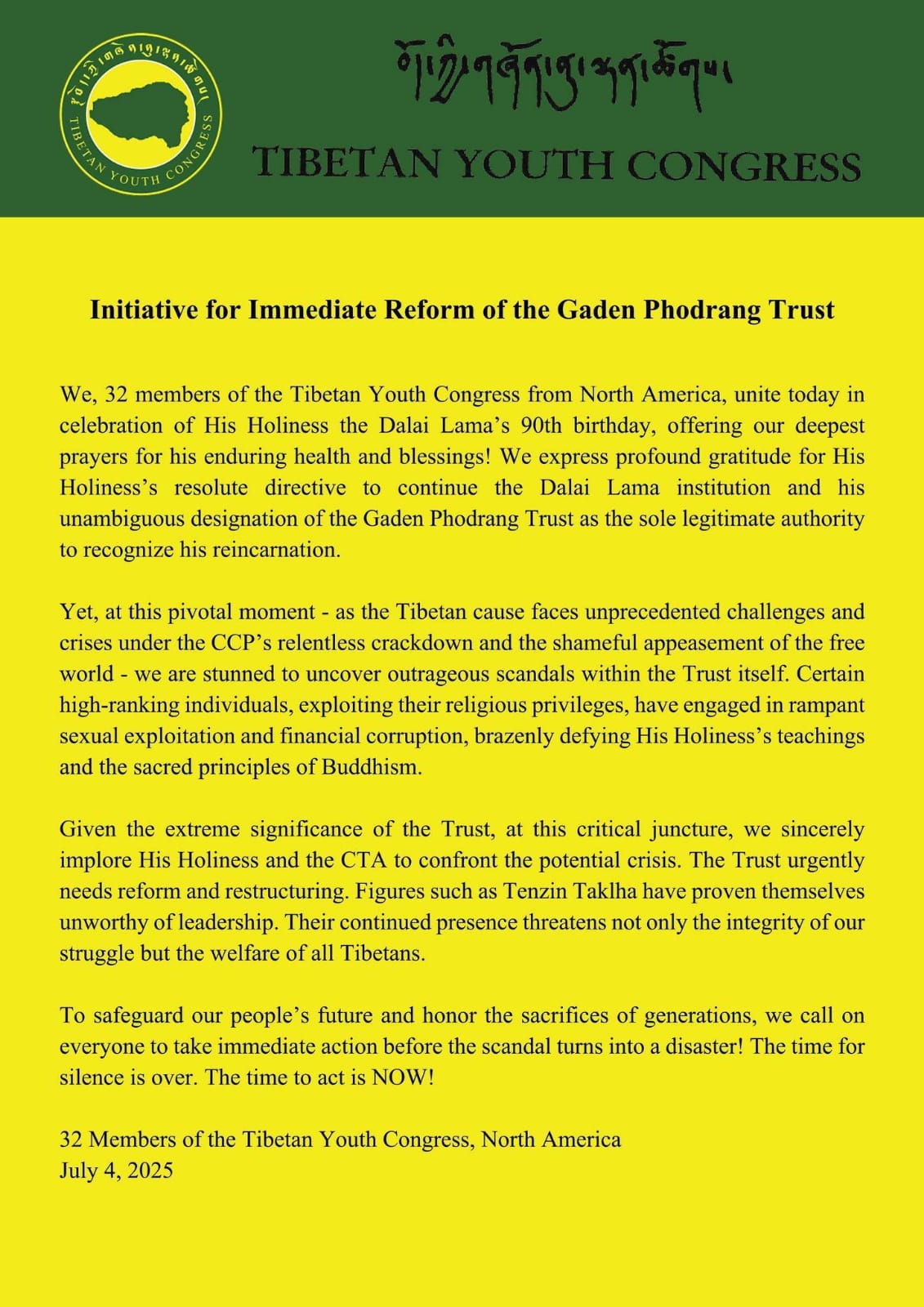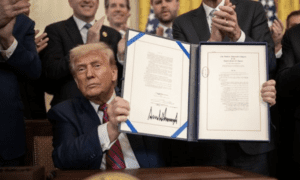In an unprecedented move that has sent shockwaves through the Tibetan exile community, 32 self-identified brave individuals of the Tibetan Youth Congress (TYC) from North America released a scathing public statement on July 4, 2025, coinciding with the 90th birthday celebrations of His Holiness the 14th Dalai Lama. Titled “Initiative for Immediate Reform of the Gaden Phodrang”, the document demands sweeping institutional reforms within the Trust, an entity recently reaffirmed by the Dalai Lama as the sole authority responsible for overseeing his future reincarnation process. Circulated widely across social media platforms, the statement not only challenges the leadership of a cornerstone Tibetan exile institution but also exposes simmering frustrations over governance, transparency, and the future of Tibet’s political and spiritual identity.
Key Demands of the Statement
This statement of TYC accuses a senior official within the Gaden Phodrang Trust of perpetuating a culture of “systemic corruption, nepotism, and financial mismanagement” and outline several key demands:
Immediate Removal of Tenzin Taklha: The statement singles out Tenzin Taklha, the Dalai Lama’s nephew and secretary, alleging his involvement in diverting funds meant for cultural preservation projects and misusing authority to suppress dissent. Tenzin Taklha, who has served as a key liaison between the Dalai Lama’s office and international donors since 2010, is accused of creating a “shadow network” of financial transactions that bypass standard accountability measures. The TYC members demand his immediate dismissal to “restore moral credibility.”
Anti-Nepotism Policies: Highlighting the concentration of power within the Dalai Lama’s inner circle, the statement urges the Central Tibetan Administration (CTA) to implement strict anti-nepotism guidelines. Critics have long pointed to Tenzin Taklha’s rise to prominence as emblematic of a broader trend where familial connections, rather than merit, dictate leadership roles. The TYC proposes a merit-based selection process for Trust officials, modeled after democratic governance structures.
Responses from Tibetan Leadership
The Office of His Holiness the Dalai Lama has remained silent, a move analysts interpret as strategic. “The Dalai Lama’s moral authority hinges on his image as a unifying figure. Engaging publicly with internal critiques risks politicizing his spiritual role,” said Tenzin Dorjee, a political scientist at the Columbia University specializing in Tibetan exile politics.
Notably, the decision to release the statement during the Dalai Lama’s birthday celebrations – a day traditionally marked by cultural events and prayers – has polarized the community. While some applaud the timing as a bold bid for global attention, others deem it disrespectful. “This day should honor the legacy of His Holiness, not air grievances,” remarked a senior monk at the Tashi Lhunpo Monastery in Karnataka, India.
Broader Implications for Tibet’s Future
Succession crisis: The Trust’s credibility is pivotal for navigating the contentious process of identifying the 15th Dalai Lama. China has repeatedly asserted its right to oversee the reincarnation, citing historical precedent. A compromised Trust could weaken the exile community’s stance against Beijing’s interference.
Generational Divides: The TYC, established in 1970, has historically advocated for more aggressive advocacy for Tibetan independence, often clashing with the CTA’s cautious diplomacy. Their latest move reflects a growing impatience among younger Tibetans with the older generation’s leadership.“This isn’t just about corruption – it’s about who gets to define Tibet’s future,” said New York-based activist Lhakpa Sherpa, a TYC member unaffiliated with the statement.
Conclusion
The Tibetan Youth Congress’s public challenge to the Gaden Phodrang Trust marks a watershed moment in exile politics, revealing deep fissures between reformists and traditionalists. As international donors reassess their engagement and China capitalizes on the chaos, the CTA faces mounting pressure to address systemic issues or risk further erosion of its legitimacy.
The Dalai Lama’s 90th birthday, which should have been observed amidst blessings and prayers, has instead become a crucible for existential debates. Whether this moment catalyzes institutional reform or deepens divisions will shape not only the fate of the Trust but also the trajectory of Tibet’s struggle for cultural survival. As one anonymous TYC member wrote: “Our loyalty is to Tibet, not to individuals. If we lose this fight, we lose everything.”



































